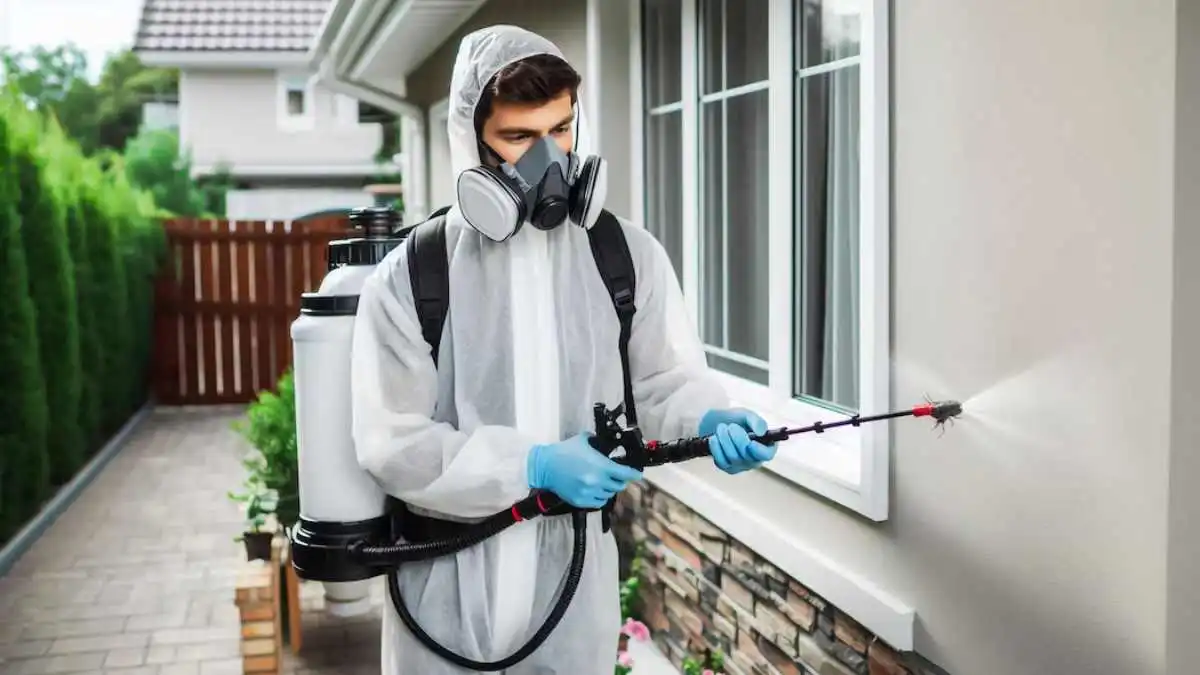HOME IMPROVEMENT
Natural Pest Control Solutions: Safe Alternatives for Your Home

With growing concerns about the environment and the potential dangers of chemical pesticides, many homeowners are searching for safer, more sustainable ways to keep their homes pest-free. Natural pest control solutions offer a way to manage common pests without exposing your family or pets to harmful chemicals. From essential oils to clever landscaping, these eco-friendly methods can help you maintain a healthy home while effectively controlling pests.
In this article, we’ll explore natural, safe alternatives to traditional pest control techniques that you can easily incorporate into your home maintenance routine.
Table of Contents
Why Go Natural with Pest Control?
Choosing natural pest control methods doesn’t just benefit the environment—it’s also better for the health and well-being of your household. Conventional chemical pesticides may kill pests, but they can leave behind residues that linger on surfaces, in the air, and in the soil around your home. These residues can be harmful to humans, pets, and beneficial insects like bees and ladybugs.
Natural pest control, on the other hand, relies on non-toxic ingredients and methods that target pests without posing a risk to the rest of your environment. Whether you’re dealing with ants in the kitchen, mosquitoes in the yard, or rodents in the attic, natural solutions can effectively manage infestations without harsh chemicals.
1. Essential Oils: Nature’s Pest Repellent
Essential oils have become popular for their pleasant aromas and health benefits, but they can also be powerful pest repellents. Many insects and rodents are repelled by the strong scents of certain essential oils, making them an effective and natural way to keep pests out of your home.
Here are some commonly used essential oils for natural pest control:
- Peppermint Oil: Peppermint oil is particularly effective against spiders, ants, and mice. Mix a few drops of peppermint oil with water and spray it around entry points like windowsills, doors, and baseboards to keep pests at bay.
- Tea Tree Oil: Known for its antimicrobial properties, tea tree oil can repel mosquitoes and other insects. Add a few drops to a spray bottle with water and mist it around your outdoor living spaces.
- Lavender Oil: While lavender is a favorite scent for humans, it’s a natural deterrent for moths, fleas, and bed bugs. Placing sachets of dried lavender in closets or drawers can help keep these pests away.
- Cedarwood Oil: Cedarwood oil is excellent for rodent control as well as repelling insects like ants and cockroaches. Its strong scent overwhelms the pests’ senses, making your home less inviting to them.
Using essential oils as a part of your pest control strategy is easy, safe, and eco-friendly. Plus, it adds a pleasant fragrance to your home while keeping unwanted guests out.
2. Diatomaceous Earth: A Natural Insect Barrier
Diatomaceous earth (DE) is a fine, powdery substance made from fossilized algae, and it’s a favorite among those looking for natural pest control solutions. DE works by dehydrating insects like ants, bed bugs, and cockroaches. When pests come into contact with DE, the sharp edges of the particles cut through their exoskeletons, leading to their eventual death.
Diatomaceous earth is non-toxic to humans and pets, making it a great option for indoor and outdoor pest control. Here’s how to use it effectively:
- Indoor Use: Sprinkle DE along baseboards, windowsills, and any cracks or crevices where pests may enter. It’s particularly effective for targeting bed bugs in the seams of mattresses and furniture.
- Outdoor Use: Apply DE around the perimeter of your home, garden beds, or any other areas where you’ve noticed ant trails or insect activity.
Be sure to use food-grade diatomaceous earth, as this is safe for humans and pets. Although DE is harmless to people, it’s best to wear a mask while applying it to avoid inhaling the fine powder.
3. Companion Planting for Natural Pest Control
For those who love gardening, companion planting is a fantastic way to manage pests naturally. Companion planting involves strategically placing plants that repel pests next to vulnerable plants, creating a natural barrier against insects.
Here are some plants that can help keep pests away from your garden:
- Marigolds: These vibrant flowers are not just beautiful; they also repel nematodes, aphids, and mosquitoes. Planting marigolds around your vegetable garden can protect your crops from insect damage.
- Basil: Basil not only enhances your cooking but also keeps mosquitoes and flies away. Plant it near doorways or outdoor seating areas for maximum benefit.
- Chrysanthemums: These flowers contain pyrethrum, a natural insecticide that repels a wide range of pests, including ants, cockroaches, ticks, and fleas.
- Garlic: Garlic is an excellent natural pest repellent for keeping mosquitoes, aphids, and beetles out of your garden. Planting garlic alongside your vegetables can help protect them from insect damage.
By incorporating these plants into your landscape, you’ll create a pest-resistant garden that doesn’t require chemical treatments.
4. Natural Rodent Control: Prevention is Key
Rodents, like rats and mice, can cause significant damage to your home by chewing through wires, insulation, and even drywall. They can also spread diseases through their droppings and urine, making rodent control an essential part of your home maintenance plan. Fortunately, there are natural ways to keep these critters at bay.
Here’s how you can prevent rodents from entering your home naturally:
- Seal Entry Points: Rodents can squeeze through even the smallest gaps. Inspect your home for cracks and holes around windows, doors, and utility pipes, and seal them using caulk, steel wool, or wire mesh.
- Natural Repellents: Place sachets of dried peppermint or bay leaves in areas where you suspect rodent activity. The strong scent will deter rodents from making your home their own.
- Cleanliness: Rodents are attracted to food scraps and garbage, so keeping your home clean is a powerful form of prevention. Store food in airtight containers and promptly clean up crumbs and spills.
If you’re dealing with persistent rodent issues, Strong Pest Control can offer professional solutions that complement your natural pest control efforts.
5. DIY Bed Bug Prevention
Bed bug extermination is often a professional job, but you can take steps to prevent bed bugs from infesting your home in the first place. Since bed bugs are excellent hitchhikers, they’re frequently introduced into homes via luggage, secondhand furniture, or clothing.
To minimize the risk of a bed bug infestation, try these natural prevention tips:
- Use Mattress Covers: Encasing your mattress and box spring in bed bug-proof covers creates a barrier that prevents bed bugs from settling in. Be sure to choose covers specifically designed for bed bug prevention.
- Inspect Secondhand Items: Before bringing secondhand furniture or clothing into your home, inspect it thoroughly for signs of bed bugs. Bed bugs are small, but their presence can often be detected by small black spots (feces) or shed skins.
- Essential Oil Sprays: You can also create a natural spray using lavender or tea tree oil mixed with water to mist your mattress, bedding, and furniture. This creates an unpleasant environment for bed bugs and helps repel them naturally.
Conclusion
Natural pest control solutions offer homeowners a safe, effective, and environmentally friendly way to manage pests without relying on harsh chemicals. From essential oils to diatomaceous earth and companion planting, there are numerous methods to keep your home and garden pest-free.
By incorporating these natural strategies into your pest control routine, you not only protect your family and pets but also reduce your environmental impact. For those dealing with more severe infestations, Strong Pest Control can provide professional assistance to ensure that your home remains a healthy and pest-free environment.
-

 GENERAL6 months ago
GENERAL6 months agoChristofle – For Those Who Dream of Family Heirloom Silver
-

 SPORTS8 months ago
SPORTS8 months agoDiscover the World of Football with Streameast: Watch Your Favorite Leagues and Tournaments
-

 GENERAL5 months ago
GENERAL5 months agoUncovering the World of кинокрадко: The Dark Side of Film Piracy
-

 GENERAL2 months ago
GENERAL2 months agoATFBooru: Anime, Gaming, and Subculture Imageboard


























